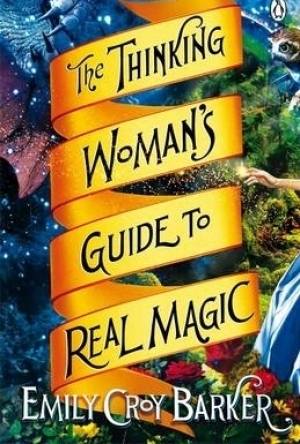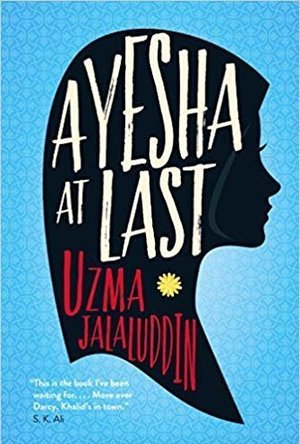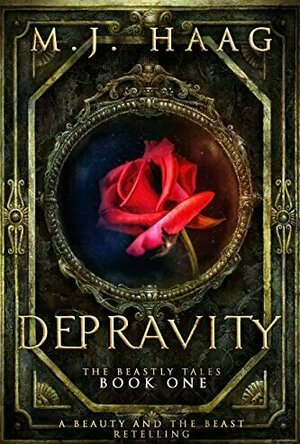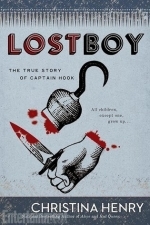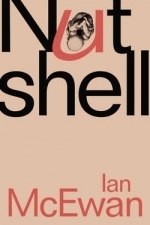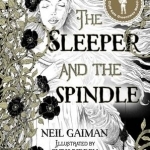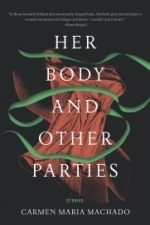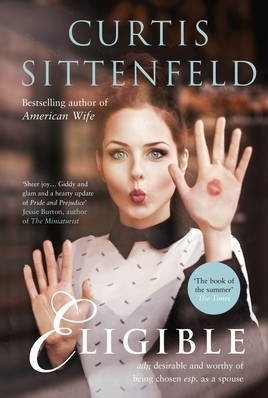Search
Goddess in the Stacks (553 KP) rated The Thinking Woman's Guide to Real Magic in Books
Jan 12, 2018
This book is FANTASTIC. I was enthralled from start to finish, and frantically looked up the author to make sure she is writing a sequel. (She is, thank goodness!) I absolutely loved the main character, Nora, and the acerbic magician Aruendiel. Even while cheering for the opposite side, I even enjoyed reading about Raclin and Ilissa, the villains of the novel.
In Nora Fischer, we have a modern, independent, feminist woman transported to a place and time where women are inferior (by nature, most think.) There are even linguistic influences that make them inferior; women speak with a lot of "um" and "well" type words in their speech, while men don't. When Nora protests that this makes women's speech sound weaker, she's told that that's "just how women speak." Seeing her confronted with the sexism ingrained within the medieval style culture, and seeing her confront Aruendiel with how sexist it actually is, was a wonderful sub-plot of the book.
The main plot was well-paced and interesting - after being kidnapped by Ilissa at the beginning of the book, and enchanted into being a beautiful, love-struck little ninny, Nora recovers herself with the help of Aruendiel, and spends the rest of the book evading re-capture and finding her place in this new world. The descriptions are colorful, the characters are deep and fascinating, and the land and culture itself shows just how much thought went into creating this world. This is an absolutely spectacular debut novel, in my opinion, and I cannot WAIT for the sequel, since Barker did leave a few questions unanswered at the end of the book. I really can't rave about this book enough. If you like fantasy, (or Pride and Prejudice, since this book, while not attempting to be a retelling or anything, had a lot of the same feel) you should really pick this one up.
You can find all my reviews at http://goddessinthestacks.wordpress.com
In Nora Fischer, we have a modern, independent, feminist woman transported to a place and time where women are inferior (by nature, most think.) There are even linguistic influences that make them inferior; women speak with a lot of "um" and "well" type words in their speech, while men don't. When Nora protests that this makes women's speech sound weaker, she's told that that's "just how women speak." Seeing her confronted with the sexism ingrained within the medieval style culture, and seeing her confront Aruendiel with how sexist it actually is, was a wonderful sub-plot of the book.
The main plot was well-paced and interesting - after being kidnapped by Ilissa at the beginning of the book, and enchanted into being a beautiful, love-struck little ninny, Nora recovers herself with the help of Aruendiel, and spends the rest of the book evading re-capture and finding her place in this new world. The descriptions are colorful, the characters are deep and fascinating, and the land and culture itself shows just how much thought went into creating this world. This is an absolutely spectacular debut novel, in my opinion, and I cannot WAIT for the sequel, since Barker did leave a few questions unanswered at the end of the book. I really can't rave about this book enough. If you like fantasy, (or Pride and Prejudice, since this book, while not attempting to be a retelling or anything, had a lot of the same feel) you should really pick this one up.
You can find all my reviews at http://goddessinthestacks.wordpress.com
Rachel King (13 KP) rated The Sleeping Beauty (Five Hundred Kingdoms, #5) in Books
Feb 11, 2019
I found this book to be quite engrossing and entertaining as a retelling of a mixture of common fairy tales, namely Sleeping Beauty and Snow White. Other tales are also given some attention, such as the Frog Prince, as a source of humor and explanation of random occurences. The lengths to which Rosa and her Fairy Godmother must go to escapes the clutches of The Tradition are both ingenious and exhausting, and it makes me appreciate that my own life is not dictated by some non-conscious "force."
I especially enjoyed the many different challenges that the two women conceived to test the many Princes vying for Rosa's hand in marriage, and I even tried to answer a few myself before I read ahead. The novel takes the modernized approach that the Damsel in Distress does not always need a man to save her from Doom - but having a few handy just in case certainly don't hurt!
I enjoyed how unique each of the characters are, even minor characters, such as some of the Princes who were eliminated early or the different Brownies in the service of the Fairy Godmother. Seigfried and Leopold are opposites in many ways, and yet they work very well together. Seigfried's bird is also great entertainment and quite convenient as a source of knowledge and backstory. The way that Leopold resolves the force of the The Tradition that has been plaguing Seigfried is rather perfect, too. The mirror spirit, Jimson, who serves the Fairy Godmother, Lily, is also quite endearing, and I found his resolution somewhat predictable, but still enjoyable.
What I like most about the Five Hundred Kingdom series is that even though each of the books in the series could qualify as a stand-alone novel, each book still sneaks in elements to connect it to the backstory of previous books, such as when Lily contacts Elena regarding dragons. The fairy tales are reimagined in the light of modern values while still favoring core elements, and even an adult such as myself can appreciate them!
I especially enjoyed the many different challenges that the two women conceived to test the many Princes vying for Rosa's hand in marriage, and I even tried to answer a few myself before I read ahead. The novel takes the modernized approach that the Damsel in Distress does not always need a man to save her from Doom - but having a few handy just in case certainly don't hurt!
I enjoyed how unique each of the characters are, even minor characters, such as some of the Princes who were eliminated early or the different Brownies in the service of the Fairy Godmother. Seigfried and Leopold are opposites in many ways, and yet they work very well together. Seigfried's bird is also great entertainment and quite convenient as a source of knowledge and backstory. The way that Leopold resolves the force of the The Tradition that has been plaguing Seigfried is rather perfect, too. The mirror spirit, Jimson, who serves the Fairy Godmother, Lily, is also quite endearing, and I found his resolution somewhat predictable, but still enjoyable.
What I like most about the Five Hundred Kingdom series is that even though each of the books in the series could qualify as a stand-alone novel, each book still sneaks in elements to connect it to the backstory of previous books, such as when Lily contacts Elena regarding dragons. The fairy tales are reimagined in the light of modern values while still favoring core elements, and even an adult such as myself can appreciate them!
Molly J (Cover To Cover Cafe) (106 KP) rated The Man He Never Was in Books
Feb 27, 2019
I believe in honesty, so I'll make my review completely honest. I didn't like this book. Not at first. It took me a bit to get into it. I don't normally read this type of book. But, after hearing of some rave reviews on it, I decided to take a dive and branch out to another realm of reading. Mr. Rubart, I will tell you that after a couple of tries, I finally got into the book and it swept me away and left me in awe of your amazing talent and ability to create a retelling like this.
Toren Daniels is a man with two sides: good.....and evil. I never really thought of my own life as having a good side and an evil side, until Toren's story came to life for me. The anger, the pain, the not knowing what happened and the why of it all.....those are all things that Toren struggles with, and he seeks out to remedy that. Those are things that we, as everyday human beings, struggle with. It's an emotional roller coaster ride for certain as the reader gets to follow Toren through his life and see how he deals with with doing right and wrong, good or evil.
This ended up, in my honest opinion, a 4 star read. It's a story that will not only entertain you after you give it a chance, but it's a story that will twist you up and make you think, really, really think about the meaning of good versus evil, and the way the Lord helps to deal with those. I definitely will be sharing this book with other Christian fiction fans! Mr. Rubart, hats off to you for creating this story full of meaning and truth.
*I received a complimentary copy of this book from the publisher and was under no obligation to post a review, positive or negative.*
Toren Daniels is a man with two sides: good.....and evil. I never really thought of my own life as having a good side and an evil side, until Toren's story came to life for me. The anger, the pain, the not knowing what happened and the why of it all.....those are all things that Toren struggles with, and he seeks out to remedy that. Those are things that we, as everyday human beings, struggle with. It's an emotional roller coaster ride for certain as the reader gets to follow Toren through his life and see how he deals with with doing right and wrong, good or evil.
This ended up, in my honest opinion, a 4 star read. It's a story that will not only entertain you after you give it a chance, but it's a story that will twist you up and make you think, really, really think about the meaning of good versus evil, and the way the Lord helps to deal with those. I definitely will be sharing this book with other Christian fiction fans! Mr. Rubart, hats off to you for creating this story full of meaning and truth.
*I received a complimentary copy of this book from the publisher and was under no obligation to post a review, positive or negative.*
ClareR (6074 KP) rated Ayesha At Last in Books
Apr 4, 2019
A book that deserves to be read A LOT!!
I absolutely adored this book. If I could unread it and then read it again for the first time, I would!
It’s Pride and Prejudice set in modern Canada with a Muslim cast. Ayesha wants to work to pay her Uncle back for all the help he has given her and her family, but her real love is poetry, not teaching High School. She is asked by her rather spoilt cousin, Hafsa, to cover for her at a mosque event meeting under the guise of being Hafsa. There, she meets Khalid, and finds herself falling for a devout, conservative Muslim - something she doesn’t want to do - who is also shy, kind and handsome. However, when Khalid’s controlling mother organises marriage between the real Hafsa and Khalid, knowing the identity of the Hafsa that Khalid has met, both Khalid and Ayesha realise that they haven’t necessarily got what they want.
There was so much heart in this story - I particularly loved the characters of Nani and Nana. They acted as the voice of reason on more than one occasion. I also loved the Shakespeare quotations: Nani always had the right quote at exactly the right time (and it was all very meta - Shakespeare quotes in an Austen retelling!).
Even the more unsavoury characters were written in such a way that I felt sorry for them - life and experiences clearly making them the way they were.
I read this on The Pigeonhole app (one section, or stave, per day for ten days) and I can honestly say that I looked forward to every single stave. If I’d had the book in my hand, I would have read it in one sitting. So I’m actually glad that The Pigeonhole forced me to savour and enjoy this gorgeous book for longer. It deserves to be savoured, and it deserves to be read a lot too!!
I really do highly recommend this book!
It’s Pride and Prejudice set in modern Canada with a Muslim cast. Ayesha wants to work to pay her Uncle back for all the help he has given her and her family, but her real love is poetry, not teaching High School. She is asked by her rather spoilt cousin, Hafsa, to cover for her at a mosque event meeting under the guise of being Hafsa. There, she meets Khalid, and finds herself falling for a devout, conservative Muslim - something she doesn’t want to do - who is also shy, kind and handsome. However, when Khalid’s controlling mother organises marriage between the real Hafsa and Khalid, knowing the identity of the Hafsa that Khalid has met, both Khalid and Ayesha realise that they haven’t necessarily got what they want.
There was so much heart in this story - I particularly loved the characters of Nani and Nana. They acted as the voice of reason on more than one occasion. I also loved the Shakespeare quotations: Nani always had the right quote at exactly the right time (and it was all very meta - Shakespeare quotes in an Austen retelling!).
Even the more unsavoury characters were written in such a way that I felt sorry for them - life and experiences clearly making them the way they were.
I read this on The Pigeonhole app (one section, or stave, per day for ten days) and I can honestly say that I looked forward to every single stave. If I’d had the book in my hand, I would have read it in one sitting. So I’m actually glad that The Pigeonhole forced me to savour and enjoy this gorgeous book for longer. It deserves to be savoured, and it deserves to be read a lot too!!
I really do highly recommend this book!
ArecRain (8 KP) rated Depravity (Beastly Tales, #1) in Books
Jan 18, 2018
First off, let me say how furious I am that this is a three part series with each novel ending in a cliff hanger. Each novel has enough meat to it to count as individual novel, but they all end in maddening cliffhangers. I loathe cliff hangers more than I loathe serials.
That being said, this series had me from page one and I couldnt put it down until the very last one. I missed a lot of sleep for it I am a huge fan of fairy tale retellings, especially if there erotica involved. This is definitely one of the better retellings of Beauty and the Beast, albeit a very dark one. The female lead is almost raped more times than I can count, abused by her obnoxious sisters, manipulated by an arrogant sorceress, and subjected to dealing with a short tempered man child stuck in a beasts body. Through it all, Benella stays determined and loved her grit.
There are some themes that may not sit well with some people, especially with the Beasts treatment of Benella in the second novel. I think they are missing the point of this story, however. The premise is not just about looking beyond aesthetic value, it is about personal growth. While it is the Beautys purpose to look beyond outer appearances to appreciate what people have on the inside; it is the Beasts role to develop from well a beast to a better person. I feel that most people look past that.
This is a great series for those looking for an adult retelling of Beauty and the Beast and can handle the dark themes and cliff hangers that come with it. If you can accept an anti-hero with faults who falls for a strong woman who can hold her own in a hateful sexist world, then this is definitely the series for you.
That being said, this series had me from page one and I couldnt put it down until the very last one. I missed a lot of sleep for it I am a huge fan of fairy tale retellings, especially if there erotica involved. This is definitely one of the better retellings of Beauty and the Beast, albeit a very dark one. The female lead is almost raped more times than I can count, abused by her obnoxious sisters, manipulated by an arrogant sorceress, and subjected to dealing with a short tempered man child stuck in a beasts body. Through it all, Benella stays determined and loved her grit.
There are some themes that may not sit well with some people, especially with the Beasts treatment of Benella in the second novel. I think they are missing the point of this story, however. The premise is not just about looking beyond aesthetic value, it is about personal growth. While it is the Beautys purpose to look beyond outer appearances to appreciate what people have on the inside; it is the Beasts role to develop from well a beast to a better person. I feel that most people look past that.
This is a great series for those looking for an adult retelling of Beauty and the Beast and can handle the dark themes and cliff hangers that come with it. If you can accept an anti-hero with faults who falls for a strong woman who can hold her own in a hateful sexist world, then this is definitely the series for you.
Christina Haynes (148 KP) rated Lost Boy in Books
Feb 10, 2018
LOST BOY by CHRISTINA HENRY
Contains spoilers, click to show
The second star to the right and straight on till morning. That's how Peter Pan always starts. But what if there was more too it. Than just going to Neverland to never grow up?
I never really knew how I felt about Peter Pan and Captain Hook. Of course, I never wanted to grow up (I still don't) but as I got older, I soon realized that Peter Pan wasn't always such a sweet boy and Christina Henry's version of Neverland confirmed my suspicions.
Even in the book Peter Pan is still a boy who lives in Neverland with his Lost Boys. One of the Lost Boys is called Jamie, who's soon to become the infamous Captain Hook.
Peter Pan collects things like a Magpie, he collects boys. He first collected a boy called Jamie and for a long time, it was just the two of them. Before they found the twins and brought them to Neverland, they used to play games and fight pirates. They were brothers till the end. That was until Peter brought Charlie to Neverland.
That was when Jamie soon started to see that Peter wasn't a hero, wasn't a friend - he was just a Lost Boy.
Peter Pan always made you feel special, important and apart from Neverland. A place where you could be young forever and never have to worry again.
The word 'grownups’ made Peter sick and this is why I always thought that Peter Pan hated pirates, and why he always hated Hook. In fact, he hated Hook for another reason and that reason is, Captain Hook was Peter’s first Lost Boy. His first best friend. But that was until Hook grew up.
Christina Henry turns a classic story into the truth. She delves into the dark past of Peter Pan, retelling the truth behind the fairytale, the truth behind the Hook. The truth behind Neverland and what it means to be a Lost Boy.
TICK TOCK GOES THE CROC
Love, Christina ?
I never really knew how I felt about Peter Pan and Captain Hook. Of course, I never wanted to grow up (I still don't) but as I got older, I soon realized that Peter Pan wasn't always such a sweet boy and Christina Henry's version of Neverland confirmed my suspicions.
Even in the book Peter Pan is still a boy who lives in Neverland with his Lost Boys. One of the Lost Boys is called Jamie, who's soon to become the infamous Captain Hook.
Peter Pan collects things like a Magpie, he collects boys. He first collected a boy called Jamie and for a long time, it was just the two of them. Before they found the twins and brought them to Neverland, they used to play games and fight pirates. They were brothers till the end. That was until Peter brought Charlie to Neverland.
That was when Jamie soon started to see that Peter wasn't a hero, wasn't a friend - he was just a Lost Boy.
Peter Pan always made you feel special, important and apart from Neverland. A place where you could be young forever and never have to worry again.
The word 'grownups’ made Peter sick and this is why I always thought that Peter Pan hated pirates, and why he always hated Hook. In fact, he hated Hook for another reason and that reason is, Captain Hook was Peter’s first Lost Boy. His first best friend. But that was until Hook grew up.
Christina Henry turns a classic story into the truth. She delves into the dark past of Peter Pan, retelling the truth behind the fairytale, the truth behind the Hook. The truth behind Neverland and what it means to be a Lost Boy.
TICK TOCK GOES THE CROC
Love, Christina ?
Zuky the BookBum (15 KP) rated Nutshell in Books
Mar 15, 2018
I’ve never read any of Ian McEwan’s work before, but it seems like I started on a good one, because almost everyone is saying this is his best yet!
This has such an intriguing and unique plot, it would be hard to pass it up if you saw it in store. Are there actually <i>any</i> other novels out there told from the PoV of a foetus?
Considering no one actually knows what it’s like to be a foetus, that is to say, we’ve all been one, but we don’t remember back that far, I feel like McEwan really <i>got</i> what it’s like to be in the womb through the third trimester.. I wasn’t sure how anyone could write as an unborn child but it was done so well in this! The child was a very likable character, he was witty, intelligent and interesting - certainly not things I would think to associate with an unborn child.
The overall plot was certainly different and intriguing, but it wasn’t exactly what I thought it was going to be. I didn’t expect this unborn child to be able to solve a murder or stop a crime etc, but I did think it was going to be more of a thriller mystery than it was. That’s not to the say that the plot made the story any less fun to read, I just had to alter my mindset into accepting this as a different sort of book.
Unfortunately for me, this didn’t move me as much as it has done other readers because this is a <i>Hamlet</i> retelling, but I’ve never read <i>Hamlet.</i> (I have pretty much no time for the “classics”, they tend to just bore me, there’s no way around that, I’m just not that kind of girl). So maybe some of the beauty of this was a bit lost on me?
Anyway, this was a very enjoyable read. A solid piece of fiction that has and will appeal to thousands.
This has such an intriguing and unique plot, it would be hard to pass it up if you saw it in store. Are there actually <i>any</i> other novels out there told from the PoV of a foetus?
Considering no one actually knows what it’s like to be a foetus, that is to say, we’ve all been one, but we don’t remember back that far, I feel like McEwan really <i>got</i> what it’s like to be in the womb through the third trimester.. I wasn’t sure how anyone could write as an unborn child but it was done so well in this! The child was a very likable character, he was witty, intelligent and interesting - certainly not things I would think to associate with an unborn child.
The overall plot was certainly different and intriguing, but it wasn’t exactly what I thought it was going to be. I didn’t expect this unborn child to be able to solve a murder or stop a crime etc, but I did think it was going to be more of a thriller mystery than it was. That’s not to the say that the plot made the story any less fun to read, I just had to alter my mindset into accepting this as a different sort of book.
Unfortunately for me, this didn’t move me as much as it has done other readers because this is a <i>Hamlet</i> retelling, but I’ve never read <i>Hamlet.</i> (I have pretty much no time for the “classics”, they tend to just bore me, there’s no way around that, I’m just not that kind of girl). So maybe some of the beauty of this was a bit lost on me?
Anyway, this was a very enjoyable read. A solid piece of fiction that has and will appeal to thousands.
Louise (64 KP) rated The Sleeper and the Spindle: Winner of the Cilip Kate Greenaway Medal 2016 in Books
Jul 2, 2018
My thoughts:
What a beautiful book! How have I not come across Chris Riddell before? I do not know! What an amazing illustrator!
The sleeper in the spindle is a combination of sleeping beauty and snow-white retelling with Gaiman’s dark twist added to it.There are two lands which are separated by huge mountains which no-one can get across, not even the birds fly over, the only one’s are three dwarves and they tunnel under. The dwarves are off to find the queen some silks for her pending wedding. Dorimar is the other kingdom where they make the best silks, once the dwarves get there they come across an Inn, which they usually drop by as they made friends with the local innkeeper. Only this time the Inn was packed with Villagers, There Is a plague travelling across the kingdom which puts everyone into a slumber which was casted by an enchantress. With this news the dwarves return to the Queen to let her know what is going on the other side of the mountains and could possibly come across to Kanselaire. With her pending wedding and the thoughts of being a dutiful wife and mother, one last adventure is what she needs, she is off to save Dorimar.
I have actually read the sleeper in the spindle before but from Gaiman’s short story collection Trigger Warning.
The story is very short only 72 pages so can be easily done in one sitting. However there is not a lot of character development and the Villain is the same old power/youth hungry menace.The ending will not be to everyone’s taste,but it was well written and an easy read
The illustrations are absolutely stunning, they are black and white with gold leaf added on every page, The detail is so intricate and amazing and definitely complements the story really well.
I definitely recommend this book to anyone as it is classed as a children’s book.
I gave this book 4 out of 5 stars.
What a beautiful book! How have I not come across Chris Riddell before? I do not know! What an amazing illustrator!
The sleeper in the spindle is a combination of sleeping beauty and snow-white retelling with Gaiman’s dark twist added to it.There are two lands which are separated by huge mountains which no-one can get across, not even the birds fly over, the only one’s are three dwarves and they tunnel under. The dwarves are off to find the queen some silks for her pending wedding. Dorimar is the other kingdom where they make the best silks, once the dwarves get there they come across an Inn, which they usually drop by as they made friends with the local innkeeper. Only this time the Inn was packed with Villagers, There Is a plague travelling across the kingdom which puts everyone into a slumber which was casted by an enchantress. With this news the dwarves return to the Queen to let her know what is going on the other side of the mountains and could possibly come across to Kanselaire. With her pending wedding and the thoughts of being a dutiful wife and mother, one last adventure is what she needs, she is off to save Dorimar.
I have actually read the sleeper in the spindle before but from Gaiman’s short story collection Trigger Warning.
The story is very short only 72 pages so can be easily done in one sitting. However there is not a lot of character development and the Villain is the same old power/youth hungry menace.The ending will not be to everyone’s taste,but it was well written and an easy read
The illustrations are absolutely stunning, they are black and white with gold leaf added on every page, The detail is so intricate and amazing and definitely complements the story really well.
I definitely recommend this book to anyone as it is classed as a children’s book.
I gave this book 4 out of 5 stars.
Goddess in the Stacks (553 KP) rated Her Body and Other Parties: Stories in Books
Sep 9, 2018
This is another book off my Wronged Women list - women who have been part of the #metoo movement. Specifically the ones that have come out against Junot Diaz and Sherman Alexie, but I hope to expand it to others as well. Her Body and Other Parties is a collection of eight surreal stories. Magical Realism is probably the best categorization for them, as they're not really fantasy. Real World stories with a touch of magic, or events that we're not sure whether they could be magic or are just in the narrator's head.
The Husband Stitch is the first story, and it's a retelling of an old children's story that I recently saw being discussed on Twitter - the one with the woman who had a green ribbon tied around her neck. Her husband always wanted to ask about it, but she refused to answer any questions about it, and wouldn't let him touch it until she was on her deathbed. In Machado's version, it isn't just the narrator that has one. Every woman does. It's different colors, in different places, but it's still never talked about. I think she means it as a metaphor for trauma. It works well.
Eight Bites is a particularly haunting piece about self-hate, body acceptance, and peer pressure. It's probably my second favorite story after The Husband Stitch.
The only one I didn't love was Especially Heinous. It was written as episode synopses of a television show, and it was interesting, but it just went on too long.
All of the stories are written well, though, and each one makes a different point. I think this would make an amazing Book Club book, because I'd love to discuss the meanings of the stories with other people. Other women, specifically. It would definitely be a great book for discussion.
You can find all my reviews at http://goddessinthestacks.com
The Husband Stitch is the first story, and it's a retelling of an old children's story that I recently saw being discussed on Twitter - the one with the woman who had a green ribbon tied around her neck. Her husband always wanted to ask about it, but she refused to answer any questions about it, and wouldn't let him touch it until she was on her deathbed. In Machado's version, it isn't just the narrator that has one. Every woman does. It's different colors, in different places, but it's still never talked about. I think she means it as a metaphor for trauma. It works well.
Eight Bites is a particularly haunting piece about self-hate, body acceptance, and peer pressure. It's probably my second favorite story after The Husband Stitch.
The only one I didn't love was Especially Heinous. It was written as episode synopses of a television show, and it was interesting, but it just went on too long.
All of the stories are written well, though, and each one makes a different point. I think this would make an amazing Book Club book, because I'd love to discuss the meanings of the stories with other people. Other women, specifically. It would definitely be a great book for discussion.
You can find all my reviews at http://goddessinthestacks.com
I understand that this is the fourth offering for 'The Austen Project' where well known authors (although I had not heard of Curtis Sittenfeld and thought she was a man, but hey.....) rewrite Austen's novels 'for a modern audience'. This does rather beg the question of if a modern reading audience does need 'dumbing down' to, as that's pretty much the implication. Trollope's Sense & Sensibility & McCall Smith's Emma have met with somewhat mixed feelings but I did think that Val McDermid worked magic with a modern retelling of Northanger Abbey. So far this is the only one to have altered the title from the original - perhaps the pressure of Pride & Prejudice was too much for anyone?
If there is a single book which as has more sequels, prequels, re-imaginings and modernisations than good old P&P then I have yet to meet it. Personally, I like to think Austen would be amused and possibly slightly bemused by it all. I'm guilty of heaving read my fair share of these, which quite often categorise as the good, the bad and the ugly! For me, this one wasn't bad, or indeed ugly, but it wasn't brilliant. It also felt that it was quite a bit longer than it needed to be. I know Kitty & Lydia are rather vulgar and embarrassing in the original but their behaviour here is really beyond the pale - who on earth would want to date Lydia if she behaves as she does here?
Some of the ideas are good, some things seem a bit contrived and over the top. I also found it quite American and slangy in places with some slang words or expressions leaving me somewhat in the dark but then I am a woman who can't bear Text Speak!
Overall, while it wasn't a bad read, it wasn't that great and I can't see myself reading it again.
If there is a single book which as has more sequels, prequels, re-imaginings and modernisations than good old P&P then I have yet to meet it. Personally, I like to think Austen would be amused and possibly slightly bemused by it all. I'm guilty of heaving read my fair share of these, which quite often categorise as the good, the bad and the ugly! For me, this one wasn't bad, or indeed ugly, but it wasn't brilliant. It also felt that it was quite a bit longer than it needed to be. I know Kitty & Lydia are rather vulgar and embarrassing in the original but their behaviour here is really beyond the pale - who on earth would want to date Lydia if she behaves as she does here?
Some of the ideas are good, some things seem a bit contrived and over the top. I also found it quite American and slangy in places with some slang words or expressions leaving me somewhat in the dark but then I am a woman who can't bear Text Speak!
Overall, while it wasn't a bad read, it wasn't that great and I can't see myself reading it again.
